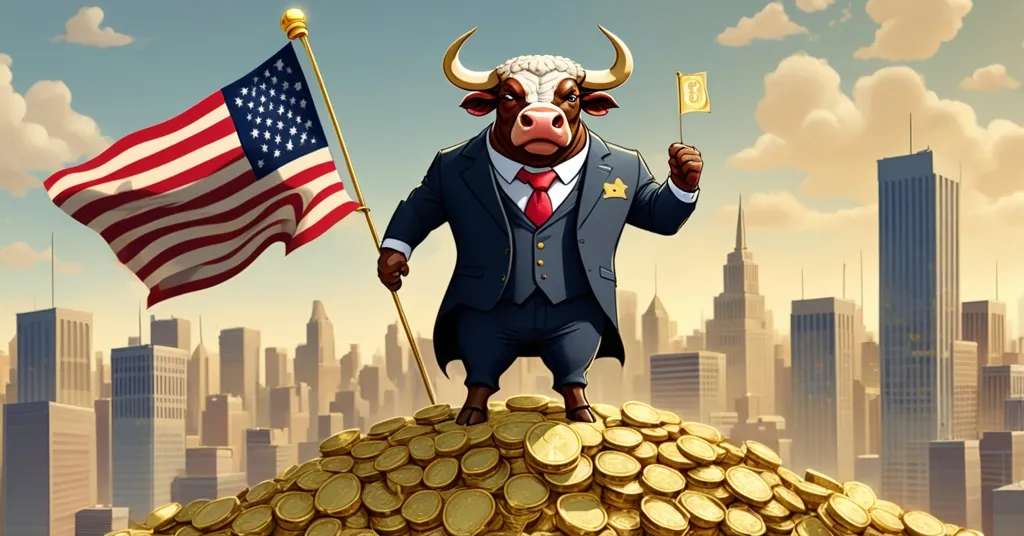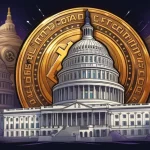Trump Proposes Gold-Backed Currency and Stronger Capitalism for U.S. Economy

Trump’s Bold Economic Vision: Gold, Capitalism, and the Future of America
Former President Donald Trump has stirred the economic pot with his latest statements on gold and capitalism, setting the stage for a heated debate on the future of American economics. His vision suggests a return to traditional economic principles, challenging the current economic landscape.
- Trump proposes a return to a gold-backed currency
- Advocates for stronger free-market capitalism
- Criticizes current economic policies on inflation and spending
- Mixed reactions from economists and political analysts
Trump’s Proposal for a Gold-Backed Currency
Trump’s vision for the U.S. economy includes a return to a gold-backed currency, a move he believes would bring stability and prosperity. “A return to a gold-backed currency would bring stability and prosperity back to our economy,” he declared. This proposal echoes back to an era when currencies were tied to gold, a system abandoned in the 1970s following the collapse of the post-World War II financial system, known as the Bretton Woods system.
A gold-backed currency means the value of money is directly linked to a specific amount of gold, which can limit how much money a government can print. Imagine if every dollar you held was backed by a tiny piece of gold. This could help control inflation, as governments would need more gold to print more money. But, let’s not kid ourselves—gold standards are as old school as flip phones; they might look cool, but they’re a bit out of touch with today’s global economy.
Advocacy for Free-Market Capitalism
Trump’s economic vision doesn’t stop at gold. He’s a vocal advocate for free-market capitalism, pushing for reduced government intervention in the economy. “We need to embrace free-market capitalism and reduce government interference to unleash America’s economic potential,” he stated. This means businesses would operate with little government control, aligning with his previous administration’s efforts at tax cuts and deregulation.
However, Trump’s use of tariffs during his presidency suggests a more nuanced approach, perhaps leaning towards what some have termed “command capitalism.” Tariffs are taxes on imported goods, which can protect domestic industries but also lead to higher prices for consumers. It’s like wanting to have your cake and eat it too—advocating for free markets while slapping on tariffs. Talk about mixed signals!
Criticism of Current Economic Policies
Trump’s critique of current economic policies, particularly those related to inflation and government spending, remains consistent. He’s argued that these policies are detrimental to the economy, a view that resonates with some economists but is met with skepticism by others. The current economic environment, characterized by debates over inflation and the role of the Federal Reserve, provides a timely backdrop for Trump’s statements.
Reactions and Criticisms
The reactions to Trump’s proposals have been as varied as the U.S. economy itself. Some economists, like Stephen Moore and Oren Cass, have expressed cautious support, highlighting potential benefits such as increased domestic investment and economic opportunity. However, others, including Justin Wolfers and Lawrence Summers, have been more critical, with Summers estimating the economic loss from Trump’s tariff policy at around $30 trillion. Paul Krugman went as far as to compare the tariffs to the Smoot-Hawley tariff of 1930, calling them a “much bigger shock” to the economy.
Critics argue that returning to a gold standard could be impractical in today’s global economy, and his views on free-market capitalism might overlook the need for certain government regulations. Moreover, rumors of potential capital controls and wage and price controls reminiscent of Richard Nixon’s era suggest a departure from the pure free-market principles Trump espouses. It’s like trying to fit a square peg in a round hole—good luck with that.
Potential Impact on the Economy
As we navigate this polarized political climate, Trump’s proposals could lead to significant shifts in monetary policy and government economic intervention. These changes could affect inflation rates, currency stability, and overall economic growth, potentially disrupting global trade and leading to counter-tariffs from other countries.
Trump’s interest in the physical gold stored at Fort Knox adds another layer to his economic strategy. Discussions about a potential audit of Fort Knox’s gold reserves could play into public perception of his policies and his focus on gold as a stabilizing force. It’s like a treasure hunt, but instead of pirates, we’ve got politicians.
What You Need to Know
- What are the potential benefits of a gold-backed currency?
A gold-backed currency could stabilize the economy by limiting the ability to print money arbitrarily, potentially reducing inflation.
- How does Trump propose to strengthen free-market capitalism?
Trump suggests reducing government intervention and promoting private sector growth to unleash America’s economic potential.
- What are the main criticisms of Trump’s economic vision?
Critics argue that returning to a gold standard could be impractical in today’s global economy and that his views on free-market capitalism might overlook the need for certain government regulations.
- How might these proposals impact the current economic landscape?
These proposals could lead to significant shifts in monetary policy and government economic intervention, potentially affecting inflation rates, currency stability, and economic growth.
- What is the general reception to Trump’s economic ideas?
Reception is mixed, with some economists and political figures supporting the ideas, while others express skepticism about their feasibility and potential impact.
Trump’s bold statements on gold and capitalism signal a vision that could reshape American economics. Whether these ideas will gain traction or fade into the background noise of political discourse remains to be seen. But one thing is clear: Trump’s economic vision continues to challenge the status quo, sparking debate and discussion on the future of the U.S. economy. It’s like a rollercoaster ride—thrilling for some, terrifying for others—and we’re all along for the ride.



